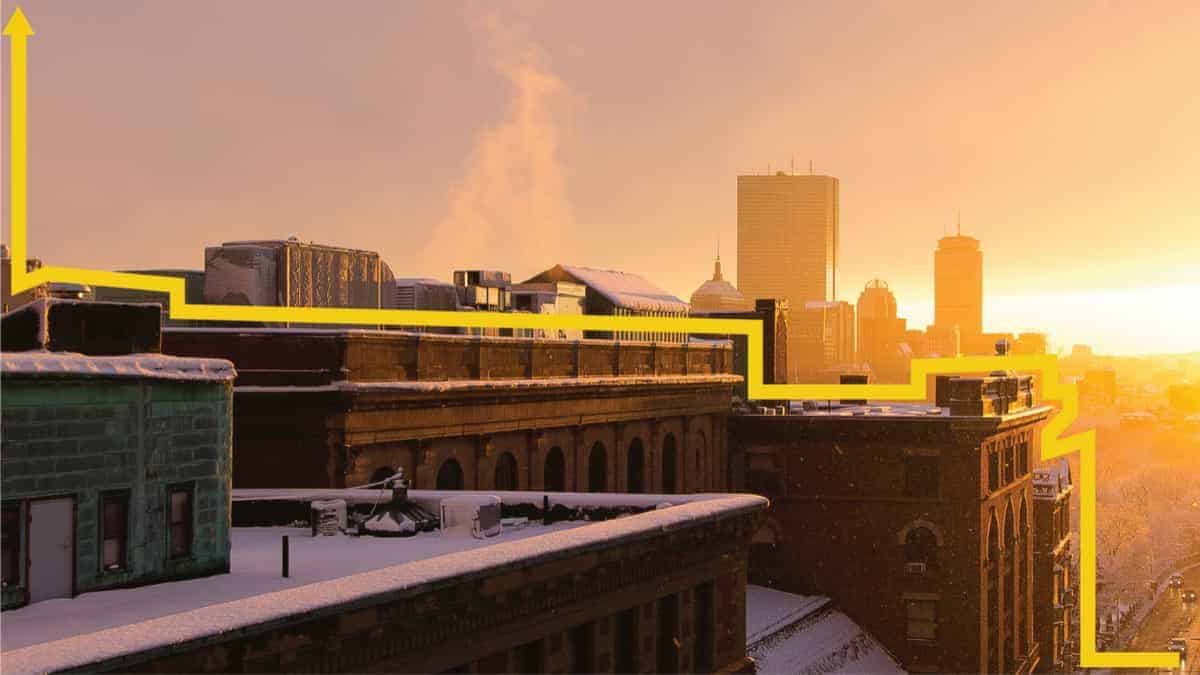Whether you’re breaking ground for your first office space or expanding your startup’s geographic footprint with a second or third hub, choosing the best city for your startup is imperative.
Many would postulate that the best city for entrepreneurs lies somewhere on the West Coast – or at the very least, outside of New England. However, with its unparalleled pool of talent, iconic platform companies, and its culture of giving back, a strong case can be made that Boston, Massachusetts is the best city for startups.

Last year, Matt Wozny – Core Member, entrepreneur, and HBS grad – caught the attention of our Core community with his post on the Underscore blog, 3 Reasons to Build Your Startup in Boston. It highlighted the talent, community, and quality of life awaiting those who choose to build a business in Boston, and the post became one of our most widely shared articles to date.
New York-born and Boston-educated, Matt started his career as a management consultant before responding to the call of the more reliably interesting, chaotic, and impactful work of the startup world. Now back in Boston, Matt is leaning into his own insights around Boston’s innovation edge and is working diligently to support founders who call Boston home. Underscore Partner and Co-founder, Michael Skok, connected with him to further uncover why Boston is the best city for startups.
Listen to Michael’s full interview with Matt below, or read on for the key takeaways from our discussion.
What Are The Key Ingredients of a Great Innovation Ecosystem?
The key components of a great startup innovation ecosystem are oft debated. But according to Matt, there are a few foundational building blocks that must be in place for a startup community to succeed.
He outlined the following set of criteria, pulled partially from principles outlined in Brad Feld’s Startup Communities as well as the 2013 HBS Paper on Clusters of Innovation:
- Risk capital infrastructure.
- Labor fluidity.
- Iconic platform firms.
- Research and development (injected into commercialized products).
- A density of innovators that allows for serendipity.
- And a culture of entrepreneurs giving back to the next generation.
These factors are not only aspects of Boston’s innovation cluster – they’re strengths, and they’ve helped foster a culture of growth, innovation, and progress in the city. Here’s how.
1. Risk Capital Infrastructure
When it comes to capital, Boston has it in droves.
Investors are paying attention to the promise of Boston startups – in March 2020 alone, 60 startups saw investments of more than $1.5 billion, while April 2020 saw 54 startups receiving $3.5 billion.
Investors are eagerly shelling out billions of dollars each month to back Boston’s entrepreneurial projects and build upon the impressive growth the city has seen in the past decade.
All of this increasingly tapped potential is rooted in Boston’s history. Boston is the birthplace of modern risk capital infrastructure – Greylock, the first modern venture with an LLC structure and multiple limited partners was founded here. (Full disclosure: 2 former Greylock GPs are investors in Underscore.)
But, the truth is, we lost our groove for a time and VC firms and startups alike moved west. However, the tides are changing as a move to Silicon Valley becomes less equitable, and the city that’s been dubbed “Title Town” for its athletic prowess is working to earn a new title: The Best City for Startups.
Growth in the number of funds raised reflects this shift; for example, since Underscore VC was formed, Material Impact, Pillar, and Flare Capital – all led by former North Bridge partners – have raised new funds. And to meet growing risk capital demand, we’ve seen some great net new players, like Founder Collective, NextView, Glasswing, and Boston Seed, pop up to serve entrepreneurs alongside us.
The result is that VCs that once occupied Route 128 have moved to and multiplied in the Financial District, Back Bay, Kendall Square, and the Seaport, creating a new cluster of capital in and around the heart of Boston.
2. A Fluid and Diverse Labor Market
The unmatched talent in the greater Boston area makes the city a goldmine for entrepreneurs.
Boston will remain a center for innovation because, as Matt and Michael agree, the most important factor “is going to be access to amazing talent. It’s being able to attract the best people, keep the best people, and empower the most people.”
Ironically, Massachusetts used to be known for its strict non-compete markets, hindering outward mobility for employees when they left a company – but that changed in 2018.
With the MA Noncompete Law that took effect on October 1, 2018, free labor mobility is now the de-facto standard. That law was a leap forward that put Massachusetts in play with areas of the country that allow for worker mobility – notably those in California, like Silicon Valley.
Now, instead of leaving after getting their degrees, graduates of some of the world’s most prestigious universities stick around the city, resulting in one of the most educated and increasingly diverse workforces on the planet. For example, 2014 LinkedIn job migration data suggests that for every 100 jobs in Boston, about 8 folks left and took jobs in the Bay Area. That number has since been cut in half, with only 3-4 as of April 2020.
Additionally, Boston houses the world’s sixth-most diverse population, providing startups with a potential talent pool that brings unique perspectives that can help businesses appeal to a larger market. Several initiatives are working to open two-way access between this pool and the startup ecosystem.

Michael mentioned Hack.Diversity, an organization Underscore supports that’s “taking critical steps to tackle the under-representation of minority talent in Boston’s innovation economy.” And Matt mentioned All Raise, whose “programs give women access, guidance, and support at every step in their entrepreneurial journeys.”
''When industry leaders are asked what the greatest advantage of doing business in Massachusetts is, 52% of them said talented workers.'' Click To TweetThe greatest minds in nearly every industry – of all backgrounds and demographics – have coalesced right here in Boston, making it the best city for entrepreneurs to recruit top talent. Programs like these are creating a heterogenous group of founders and employees to work alongside, fund, and watch succeed.
3. The Company of Iconic Platform Firms
Almost every city has at least one iconic firm – a company that’s known for its monumental size, influence, and revenue.
Boston is once again becoming known for its strong presence of multiple iconic platform companies, or companies that “invest in training their employees so that they will be ready to leave and actually go out and start future businesses,” explained Matt.
Think of iconic companies as bigger, powerful businesses that – before non-competes – would have consumed startups (a la Raytheon).
An iconic platform company doesn’t consume startups, it spawns them.
Matt referenced HubSpot as an example of a company whose founders supported its former employees as they went out on their own to do the next big thing, building organizations like Crayon, Drift, and SaaSWorks.
Looking at the rest of Boston’s landscape, it’s populated by businesses that have made a name for themselves as – or, are on their way to becoming – iconic platform companies.
Acquia. Amazon. Cybereason. Demandware (Salesforce). Drift. Toast. TripAdvisor. Vertex Pharma. Wayfair. Whether it’s a headquarters or one of dozens of international offices, all of these companies have a presence right here in Boston.

The city’s roster of notable companies only serves to benefit others in their proximity. This concentration of corporate excellence has caught the attention of those aforementioned investors, and it’s created a magnet for top talent. Candidates vie to work at the city’s next unicorn or a New England branch of one of the world’s most dominant companies, with new businesses like Salsify – a company we’re proud to back – joining the ranks of the city’s greats all the time.
Here in Boston, you’ll be in good company.
4. Funding Research and Development
Boston has struck a rare balance of respecting its past while looking towards its future.
Historically, the companies that thrived in Boston were those that heavily invested time and resources into R&D. Polaroid and Raytheon are both poster child examples of companies that cemented this best practice.
Today, this effort is still alive and well. For example, in Boston’s higher education landscape, top-tier universities are investing capital into R&D in areas that are certain to play a larger role in society decades from now. The Harvard Innovation Labs and MIT’s new Schwarzman College of Computing (founded in 2018 and focusing largely on educating its attendees on AI) are leading the pack in turning students into future tech founders.
Therein lies Boston’s current competitive advantage in R&D. Institutions throughout the city – such as The Allston Fund, The Engine, Sandbox, (all of which Underscore is invested in) and E14 – are in place to ensure that students’ promising ideas can turn into profitable ventures.

Outside of educational institutions, venture capitalists are recognizing the city’s heavy R&D work. In 2019, CARB-X reiterated its pledge to invest up to $550 million in antibacterial R&D between 2016 and 2021, while restaurant technology company Toast declared its intention to invest $1 billion in hardware and software R&D over five years following a $250 million round of funding.
Between these educational centers and forward-thinking VCs, Boston has the indestructible infrastructure in place to drive and commercialize R&D from companies young and old throughout the city.
5. Density, Serendipity, and Innovation
As much as it is a diverse, metropolitan city, Boston still boasts a small-town feel compared to other similarly known and sized municipalities. The big cluster of players in a small geographic area creates an influx of opportunity for discovery alongside like-minded people in otherwise unrelated professions and areas of study.
“‘Hyper clusters,’ like Stanford Research Park, just have a high concentration of people enabling them to meet each other. We have this also in Boston,” explained Matt.
An intersection between academic, technological, and healthcare excellence, Boston is a breeding ground for collaboration in its purest forms through cross-disciplinary efforts. Boston is fostering industries that will define humanity and boast the most noteworthy advancements in the near future. Some clear examples include the following:
In synbio (synthetic biology), we see companies like Ginkgo as iconic platform companies for the ecosystem. The Edisons of our time are Bostonians like Tom Knight, Pam Silver, and George Church, who are making unprecedented advancements in this crucial industry.
For AI and ML, we’re seeing the formation of research-driven companies in Boston. Massachusetts is positioned to maintain its role as a leader here in the short term and will continue that primacy in the long term. We see this potential in companies that emerge from MIT CSAIL like Tamr, an enterprise data unification company.
For robotics – both in terms of manufacturing and logistics – Boston was home to the first system for manufacturing in the US, where we made the country’s gun stockpile at the founding of our nation. Boston became Boston because of manufacturing and logistics prowess, and look at where we are now with companies like iRobot MassRobotics, Humatics, and Activ Surgical.
For commerce, we at Underscore have witnessed first hand the rise of companies like Demandware and Endeca, which paved the way for rising stars like Salsify. Boston is also home to ecommerce companies such as Wayfair, Chewy, Rue La La, and CarGurus, which are increasingly becoming household names.
Boston is also notable for its work in infrastructure and cybersecurity – be it enterprise, govtech, data storage, or education. These sectors have always been places where Boston has operational talent and financial understanding, and the city is capitalizing on this success to build what’s next thanks to companies like Cybereason, CloudZero, Rapid7, Akamai, and Turbonomic.
And that’s just the tip of the iceberg – from healthcare and health tech, to 3D printing (companies like Formlabs, MarkForged, and Desktop Metal), to quantum computing, Boston is a hub for leading businesses in all of these industries and more.
6. A Culture of Giving Back
Matt noted that “there’s a deep sense of civic duty that permeates through greater Boston,” partially stemming from the role the city played in the American Revolution.
Today, that culture manifests itself through VC firms and entrepreneurs who keep the momentum alive for the next generation.
''Investing in the next rung of entrepreneurs is something Boston used to do very well. Then, it lost its way for a while. Recently, it's made – in my view – extraordinary headway'' - @MattWozny Click To TweetThe actions of individuals like Jody Rose of NEVCA, Jesse Bardo at SVB, or angel investors such as David Chang, Katie Rae, or Jennifer Lum, serve as moral and tangible encouragement for the subsequent wave of entrepreneurs.
We at Underscore are proud to count Gail Goodman, Emily Green, Jeff Barnett, Dries Buytaert, Tom Ebling, Elizabeth Lawler, Mark Roberge, and Jit Saxena as just a handful of our Core Partners who have made the honorable choice to invest in the next generation of entrepreneurs. As a result, there is a perpetual cycle keeping Boston as a persistent, established springboard for the next big thing – whatever that may be.
Boston: The Best City for Startups
When evaluating the 6 criteria for an optimal startup ecosystem, there’s no box on the list that Boston does not check. It’s got the capital to help businesses scale, an impressive talent pool, iconic platform firms cultivating future leaders, powerful R&D, a density of innovators from across disciplines, and a strong culture of giving back.
The research is clear – Boston is the place to be. Will you join us?
Can you help us create a 7th reason? We look forward to hearing your comments below.
Make sure you listen to our full conversation with Matt – embedded above or linked here.









